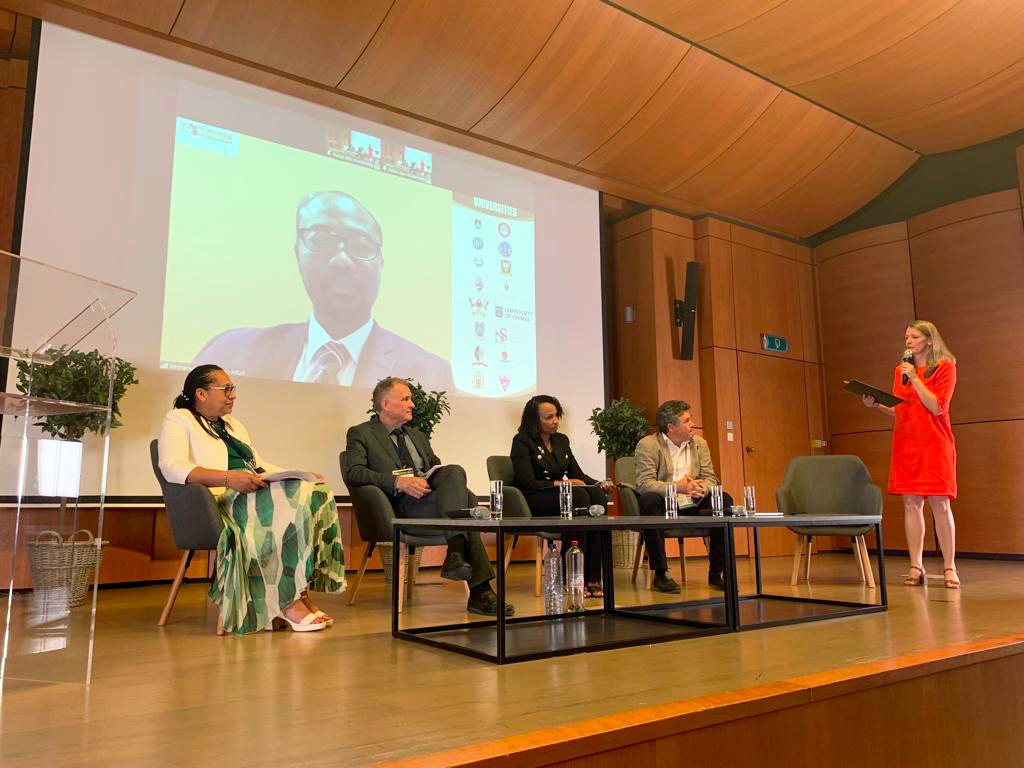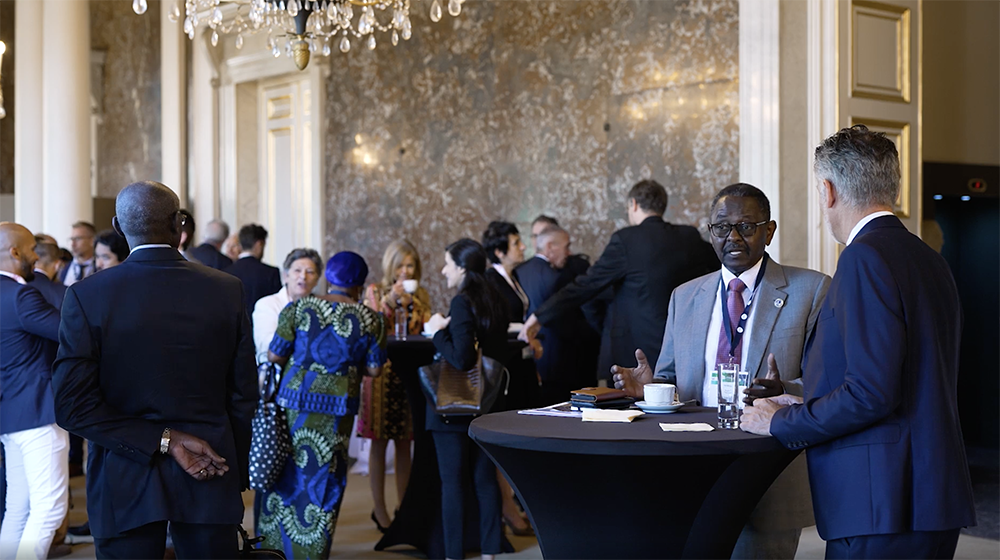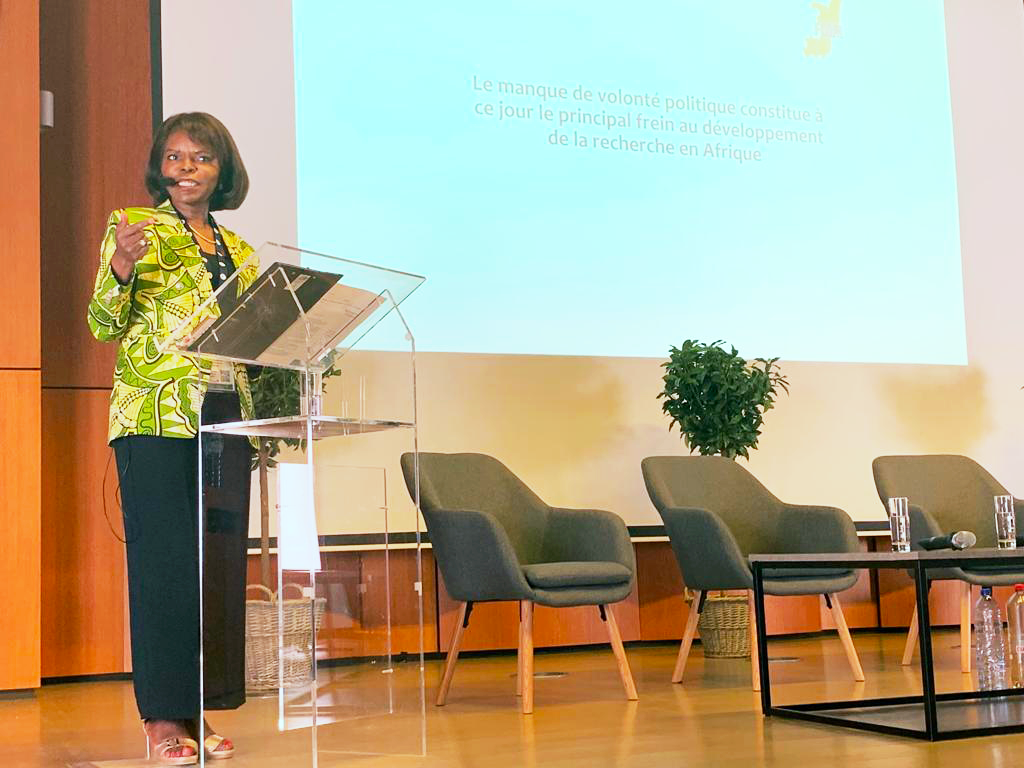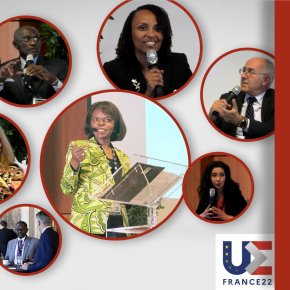
Africa and Europe seek to co-construct balanced relations in research
An event co-organised by the CNRS and the IRD brought together Europeans and Africans in Brussels on 29 June to imagine a new scientific partnership between the two continents.
"In this uncertain period marked by a succession of national and global crises, cooperation in higher education, research, and innovation is a major advantage for jointly meeting the challenges of today and tomorrow," affirms Antoine Petit, the Chairman and CEO of the CNRS. In order for "the Euro-African research community to jointly agree on a shared approach for promoting and stimulating" this cooperation between the two continents, an event entitled Imagining a New Scientific Partnership between Europe and Africa was held at Academy Palace in Brussels, Belgium on 29 June, as part of the French Presidency of the Council of the European Union (see boxed text).

Aiming to strengthen good practices and to give rise to new, revitalized, and more balanced partnerships between the two continents, the event brought together representatives from over 46 nationalities in person and online. Attendees included Fulufhelo Nelwamondo, CEO of the National Research Foundation of South Africa; Kathrin Maria Scherr, Managing Director of the Max Planck Foundation, and Lydie Hakizimana, CEO of the African Institute for Mathematical Sciences (AIMS) Global Network; Francine Ntoumi, President of the Congolese Foundation for Medical Research in the Republic of the Congo; Bakri Osman Saeed and Manuel Tunon De Lara, respectively presidents of the Association of African Universities and France Université; Patrick Levy, a European University Association board member; Aïda Hamdi, General Delegate of the UNESCO Chair for Women and Science at Paris-Dauphine; and Fadila Boughanemi, Deputy Head of the European Commission’s Asia, Africa, MENA, and External Relations Unit.
Putting science at the heart of the French Presidency of the Council of the European Union: mission accomplished for the CNRS
The event on 29 June was the latest in a series of nine meetings led by the CNRS to "spread also science" as part of the French Presidency of the Council of the European Union, which ended the following day. These events were especially intended to demonstrate to European institutions the central role played by European producers of science, such as the CNRS, in establishing scientific relations and cooperation with third countries, and especially African countries for this most recent event. "To build the future rather than be subjected to it, it is essential for governments, companies, and our societies to understand the important role played by basic research in expanding knowledge, and exploiting the resulting scientific, technical, and social innovation for the benefit of humanity, the economy, and the environment," explained Antoine Petit, the Chairman and CEO of the CNRS, who wants to "make basic research a driver of progress in the service of society (in French)."
Given the technological, societal, and environmental challenges faced by our societies, "science and research are indispensable for moving forward, via cooperation that reaches beyond disciplines, institutions, and borders," added Petit. Strengthening and renewing scientific cooperation with all countries on the African continent, notably by moving towards more equitable and lasting partnerships of excellence, is central to the CNRS’s Multi-year Cooperation Plan with Africa (in French). The latter stresses co-construction, which is "absolutely essential" for identifying subjects and forms of the cooperation, thereby "ensuring complementarity in the approaches adopted by the various stakeholders," and taking into account the distinctive features of each country. The day was planned with the French, European, and African partners of the CNRS, especially in partnership with the IRD, in an effort to discuss strategies for building enhanced scientific cooperation. The exchanges were organised with respect to the three key areas of cooperation, mobility, and networks.
Co-constructing equitable and enduring partnerships
"This new partnership model that we want to develop together seeks to reduce the asymmetries of power and knowledge between the continents, in an effort to collaborate better and to produce the knowledge our citizens and decision-makers need," affirmed Valérie Verdier, CEO of the IRD. Mohammed Belhocine, the Commissioner for Education, Science, Technology, and Innovation at the African Union,1 stressed "that the strong and integrated ecosystems for research and innovation that we will create together must be based on equitable partnerships and mutual respect," and must be adapted to different contexts "in order to respond to local and national priority issues and needs."
- 1The African Union is a continental organization founded in 2002 that includes 55 African countries.
Today Africa is home to 2.4% of the world's scientists.
Today Africa is home to less than 1% of patent applications.
Today Africa is home to less than 4% of publications.
Strengthening relations between African and European countries was one of the objectives set by France during its Presidency of the Council of the European Union. How to make the transition from policy agenda to actual practice? "It happens naturally," explained Fulufhelo Nelwamondo, CEO of the National Research Foundation (NRF) of South Africa, during the day's first roundtable regarding existing and potential cooperation tools: "Scientists create partnerships not simply for the sake of doing so, but because we are better at solving our problems if we work together." While each country in Europe and Africa has its own challenges, global issues make such collaboration a necessity.
Annual scientific production increased by 2.3 in 10 years.
A certain change is visible, as the strong scientific development of the African continent and the financial investment of governments have made it possible to define research priorities co-constructed with Europe, and to use the results on a local level. Research and innovation have become important subjects in discussions between the European Union and the African Union, at the heart of both dialogue and negotiations. For example, the participation of African scientists in projects supported by the Horizon Europe framework programme is higher than in the preceding Horizon2020 programme.

However, much remains to be done. In particular, African countries are not all at the same level with respect to the development of research and higher education. Broader relations between the continent's English-speaking and French-speaking countries is therefore indispensable to reinforcing the unity of the African higher education and research space, whose systems remain quite varied today.
In addition to funding, a number of other elements can help meet this challenge. "A key element is the capacity to evaluate partnerships, which must meet the co-constructed objectives for which they were created," pointed out Nelwamondo, all while mentioning the difficulty of measuring the impact of research with no direct short-term application for decision-makers and the population, and hence the importance of developing scientific culture.
Expanding mobility
Facilitating mobility is also one of the effective tools for addressing the lack of trained personnel, equipment, and infrastructure. All mobility can play a role, whether among African countries or between African and European countries, going in both directions and being both temporary and enduring in nature. This includes sharing resources, strengthening collaboration, ensuring a broad focus, enabling students and scientists to train in a country that has different expertise and technological means, or having scientists from these countries import their knowledge and expertise in sectors of interest to the local population.
Doing so calls for equitable partnerships that are in keeping with a long-term dynamic, and whose funding matches the issues they are attempting to address, with mobility involving students as well as researchers. "France is the world's leading host country for African students, but global competition is emerging to attract the talented persons who cannot secure a position in their own country," indicated Béatrice Khaiat, Assistant Managing Director of Campus France.
In 2050, more than half of all Africans will be under the age of 25.
Mobility also responds to an important demographic challenge, with increasing numbers of youth gaining access to higher education in most countries on the African continent, but with insufficient infrastructure and funding, and few available positions in both the public or private sectors. In addition to the co-construction of degrees between Africa and Europe, the diaspora can help in two ways: by facilitating hosting in the countries in which they have settled, and by returning to help develop research and innovation in their country of origin, along with the industries connected to them. "It is by developing the entire value chain that we can ensure our graduates leave the university not only with a degree, but also with a job," affirmed Roger Tsafack Nanfosso, Chancellor of the University of Dschang in Cameroon.
Networks on all scales
Networks are another avenue for developing research and partnerships. They are spreading more and more in Africa both within countries and regionally—such as the centres of excellence of the African Research Universities Alliance (ARUA) with its 16 members, or the African Institute for Mathematical Sciences Global Network—as well as internationally with the UNESCO Chairs network,2 for instance. These networks enable better use of available technological and financial resources, with no redundancy, and also allow talented scientists to share their knowledge and expertise in order to tackle transnational problems. By reaching a critical mass of scientists for a given subject, the resulting visibility can attract funders, and ensure that the knowledge produced will have an impact.

Networks are also instrumental in helping the mobility of scientists and students, forging ties, and promoting good practices such as open science. Their role in training and innovation is well established. Faced with the risk of the "brain drain" that could result from mobility, and in a broader setting of sustainable development, the use of digital tools for remote teaching and collaboration in the form of networks can also be useful. Various methods of funding and organisation have been discussed, all with a common point, namely that the involvement of scientific and governmental institutions is crucial to ensuring the continued existence of these networks, which often grow out of informal exchanges between scientists and laboratories.
This is precisely how the "Environnement, Santé, Sociétés" International Research Laboratory (IRL)3 emerged. At one of the three interventions of experts that marked the day, its director Lamine Gueye presented the elements that contributed to the success story of the CNRS's only international laboratory in West Africa. He emphasized the importance of research training in ensuring that projects and networks last over the long term. This high level of formal partnership facilitates cooperation, and provides additional insights into the constraints of the living environment and societal transformations identified in the region.
The spread of knowledge, a key for the future
Another highly noticed intervention was that of Francine Ntoumi, President of the Congolese Foundation for Medical Research in the Republic of the Congo, who presented the primary issues and obstacles relating to developing research and spreading scientific culture in Africa, essential components in combatting fake news and ensuring the attractiveness of scientific careers among youth. She is a professor of the molecular epidemiology of infectious diseases, especially malaria, tuberculosis, and AIDS, at the University of Tübingen (Germany), as well as President of the IRD Scientific Board. "Talking about science entails talking about the future. Talking about scientific culture entails talking about broad investment in humans," she summarized, before insisting on the importance of "combining our efforts to meet demographic, climatic, and technological challenges," as demonstrated by the Covid crisis.
- 2A programme encouraging cooperation between universities internationally is the UNESCO Chairs Network (UNITWIN Programme), which was launched in 1992 to improve results and pool together expertise. It includes nearly 900 chairs, of which 89 are on the African continent.
- 3CNRS/National Centre for Scientific and Technical Research (Morocco)/Gaston Berger Saint Louis University of Senegal/Cheikh Anta Diop University (Dakar)/University of Sciences, Techniques, and Technologies of Bamako (Mali).
The role of women in research in Europe and Africa
Focus was also placed on the role of women in the world of research, engineering, and innovation, with the main conclusion that there are good and bad examples in both Europe and Africa, as the proportion of women working in these sectors is highly dependent on the culture and history of each country. The glass ceiling, which translates into a lower number of women in senior positions compared to the available pool, is a concern everywhere. Two elements seem to make a difference: the role of public authorities, which remains crucial to improving science instruction and the diffusion of information regarding these careers among youth, and access to role models.
"Science must play a major and decisive role in building a new Africa," she added, an effort that is already underway. The primary obstacle is a lack of political will, as "no country" has fulfilled its commitments in terms of investment in research, with dialogue between scientists and political decision-makers remaining limited. However, "Africa has talented scientists," and countries in the Global South do not want to be "simple consumers" of solutions conceived in the North. It is therefore necessary to develop adequate public policies. With regard to scientific culture, numerous actions have been organized to "develop awareness of the world surrounding us": science books and kits for children, mentorship programmes, and awareness campaigns with women and girls (see boxed text), etc. However, there is insufficient funding to support these scientific mediation actions, or research itself. Any partnership that wants to succeed must take these parameters into account. "I believe in this partnership between Europe and Africa if the resources are allocated," she continued, a statement that clearly communicated the expectations of all actors present.
Rectifying asymmetries above all
An exhilarating account closed the day. Mame-Penda Ba, an academic at the Gaston Berger University of Senegal, presented the new scientific journal Global Africa,4 for which she serves as editor-in-chief, and which celebrated its first anniversary. Setting out from this example, she revisited issues relating to the transformation of the global knowledge production and knowledge sharing ecosystem on the African continent: university presses are striving to once again become effective in comparison to foreign publishers, despite a lack of staff trained in the publishing trade, difficulty accessing journals—open science was an oft-cited topic of the day—and no training in scientific writing for researchers, who are subsequently excluded from the international system. "We do not need a mutually beneficial partnership. We want a quality partnership, one that is focused on Africa and rectifies the deep asymmetries between the North and the South, between Europe and Africa," she underscored at the outset of her speech, demanding "fewer promises" and more concrete actions that are able to "revisit everything." The avenues she identified include recognizing and supporting local journals, local publishing efforts, and decolonial studies, which identify the roots of today's problems, as well as creating needed institutions such as regional hubs, recovering lost skills, and striving to include the research of African scientists in published articles.
"The various subjects broached during this event demonstrate the existence of numerous international actions, and a genuine desire to expand cooperation between our two continents. There is nevertheless room for improvement," recognized Petit. He hoped that the day would serve as a "catalyst" for bringing together research communities and stakeholders in order to pursue long-term exchange. These efforts are already underway for specific issues, with plans to hold a dedicated workshop in South Africa later in the year with the NRF in order to "reflect together on priority joint research topics."
- 4Journal co-founded by four institutions: LASPAD at the Gaston Berger University of Saint-Louis (Senegal), l'Institut de recherche et développement (France), the International University of Rabat (Morocco), and LASDEL in Niamey-Parakou (Niger-Benin).


